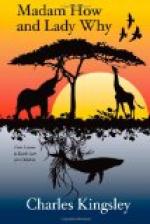And how is it kept good?
Look at all those loads of hay, which are being carried off the field. Do you think you can take all that away without putting anything in its place?
Why not?
If I took all the butter out of the churn, what must I do if I want more butter still?
Put more cream in.
So, if I want more grass to grow, I must put on the soil more of what grass is made of.
But the butter don’t grow, and the grass does.
What does the grass grow in?
The soil.
Yes. Just as the butter grows in the churn. So you must put fresh grass-stuff continually into the soil, as you put fresh cream into the churn. You have heard the farm men say, “That crop has taken a good deal out of the land”?
Yes.
Then they spoke exact truth. What will that hay turn into by Christmas? Can’t you tell? Into milk, of course, which you will drink; and into horseflesh too, which you will use.
Use horseflesh? Not eat it?
No; we have not got as far as that. We did not even make up our minds to taste the Cambridge donkey. But every time the horse draws the carriage, he uses up so much muscle; and that muscle he must get back again by eating hay and corn; and that hay and corn must be put back again into the land by manure, or there will be all the less for the horse next year. For one cannot eat one’s cake and keep it too; and no more can one eat one’s grass.
So this field is a truly wonderful place. It is no ugly pile of brick and mortar, with a tall chimney pouring out smoke and evil smells, with unhealthy, haggard people toiling inside. Why do you look surprised?
Because—because nobody ever said it was. You mean a manufactory.
Well, and this hay-field is a manufactory: only like most of Madam How’s workshops, infinitely more beautiful, as well as infinitely more crafty, than any manufactory of man’s building. It is beautiful to behold, and healthy to work in; a joy and blessing alike to the eye, and the mind, and the body: and yet it is a manufactory.
But a manufactory of what?




